‘On to something new’: Senator Lankin retires
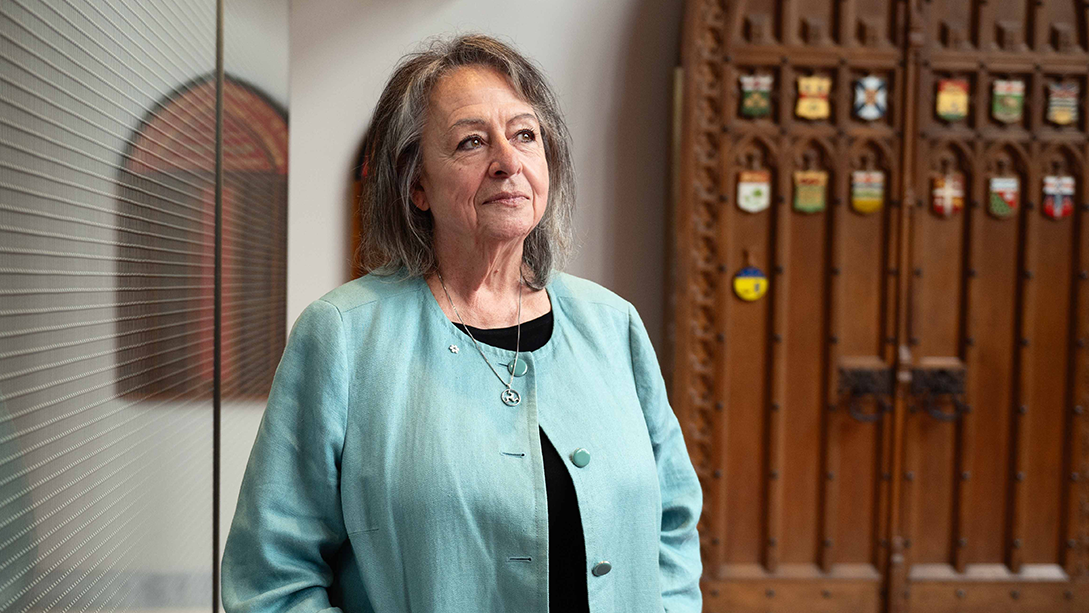
In Senator Frances Lankin’s eight years in the Senate, she worked to legalize cannabis, change the rules to the Red Chamber, examine foreign interference and adopt gender-neutral lyrics to “O Canada.”
It’s a varied Senate resume that mirrors her time in provincial politics and the unconventional career path that led her there.
Senator Frances is taking an early retirement from the Senate on October 21, 2024, but she says she’s not done working for her community. Learn about her political accomplishments and her lifelong advocacy for women’s and workers’ rights.
Your mandatory retirement date is not for another five years. What made you decide to leave the Senate early?
It’s a confluence of things in my life. My husband passed away almost two years ago, I’ve had some health issues of my own, and I’ve been thinking a lot about the right time to move on to something new.
I realized that I need to close this chapter before I can write the next because every day something comes up in the Senate Chamber that I want to follow up on. I decided in the late summer that it was time to set an early retirement date and stick to it.
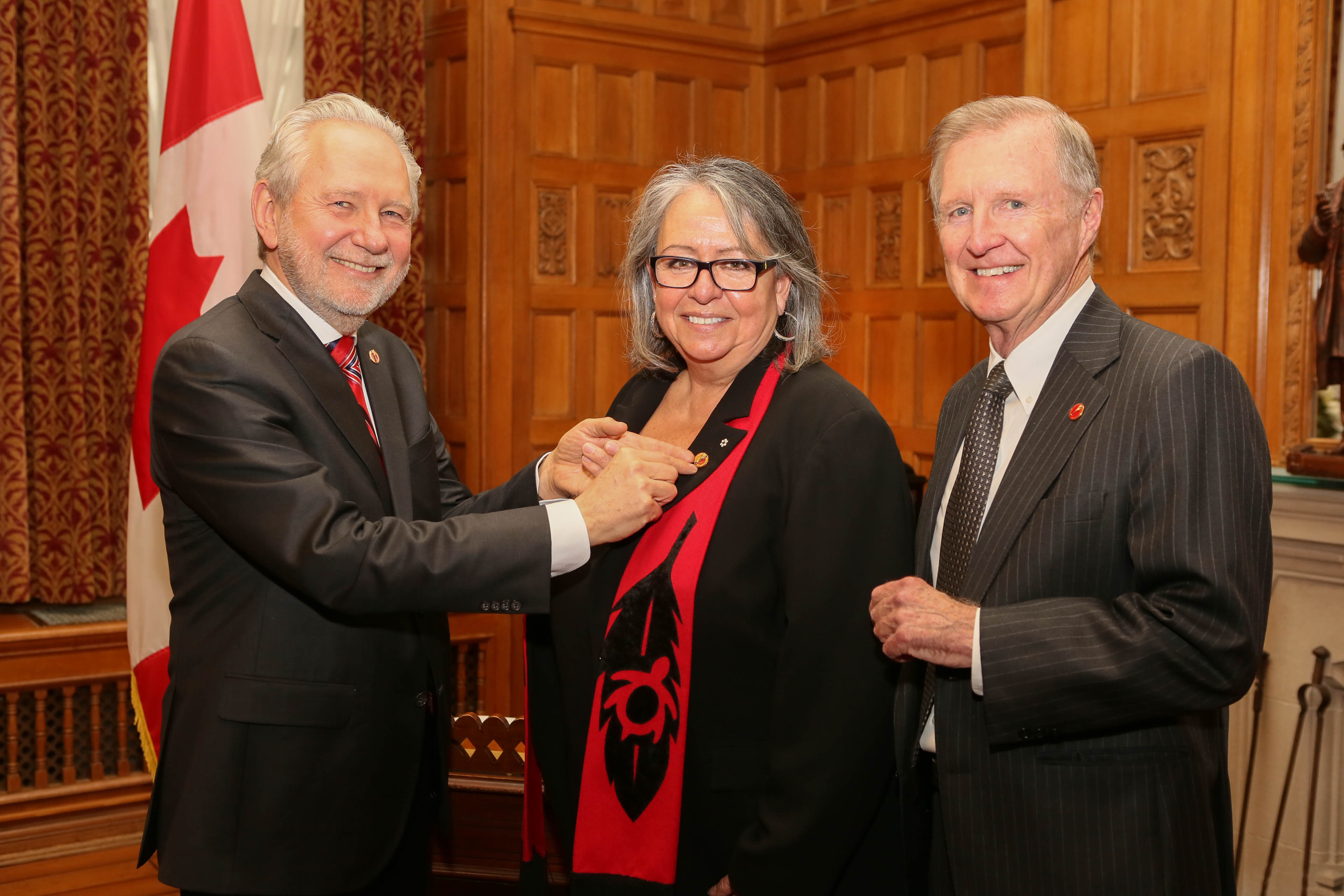 Senator V. Peter Harder gives Senator Lankin her senator’s pin ahead of her swearing-in ceremony in 2016 as former senator Bob Runciman looks on.
Senator V. Peter Harder gives Senator Lankin her senator’s pin ahead of her swearing-in ceremony in 2016 as former senator Bob Runciman looks on.
Throughout your wide-ranging career, you have advocated for women’s and workers’ rights. How did you become passionate about these issues?
After my university studies, I wanted to work in probation and parole, but the only way I could get into that line of work was through an entry-level position as a correctional officer, or a “jail guard” as it was called back then. I became one of the first women in Ontario to work as a correctional officer with male inmates at the Don Jail in Toronto.
I was quickly radicalized around issues of equality and sexual harassment in the workplace, and I started getting involved with the Ontario Public Service Employees Union (OPSEU). I eventually switched careers to work for OPSEU as an Equal Opportunities Coordinator, an economic researcher and then a negotiator for province-wide contracts. I was also a member of the Ontario Federation of Labour Women’s Committee and generally active throughout the labour movement.
I have long considered myself to be a feminist, so these issues have been in lockstep for me all the way through my career.
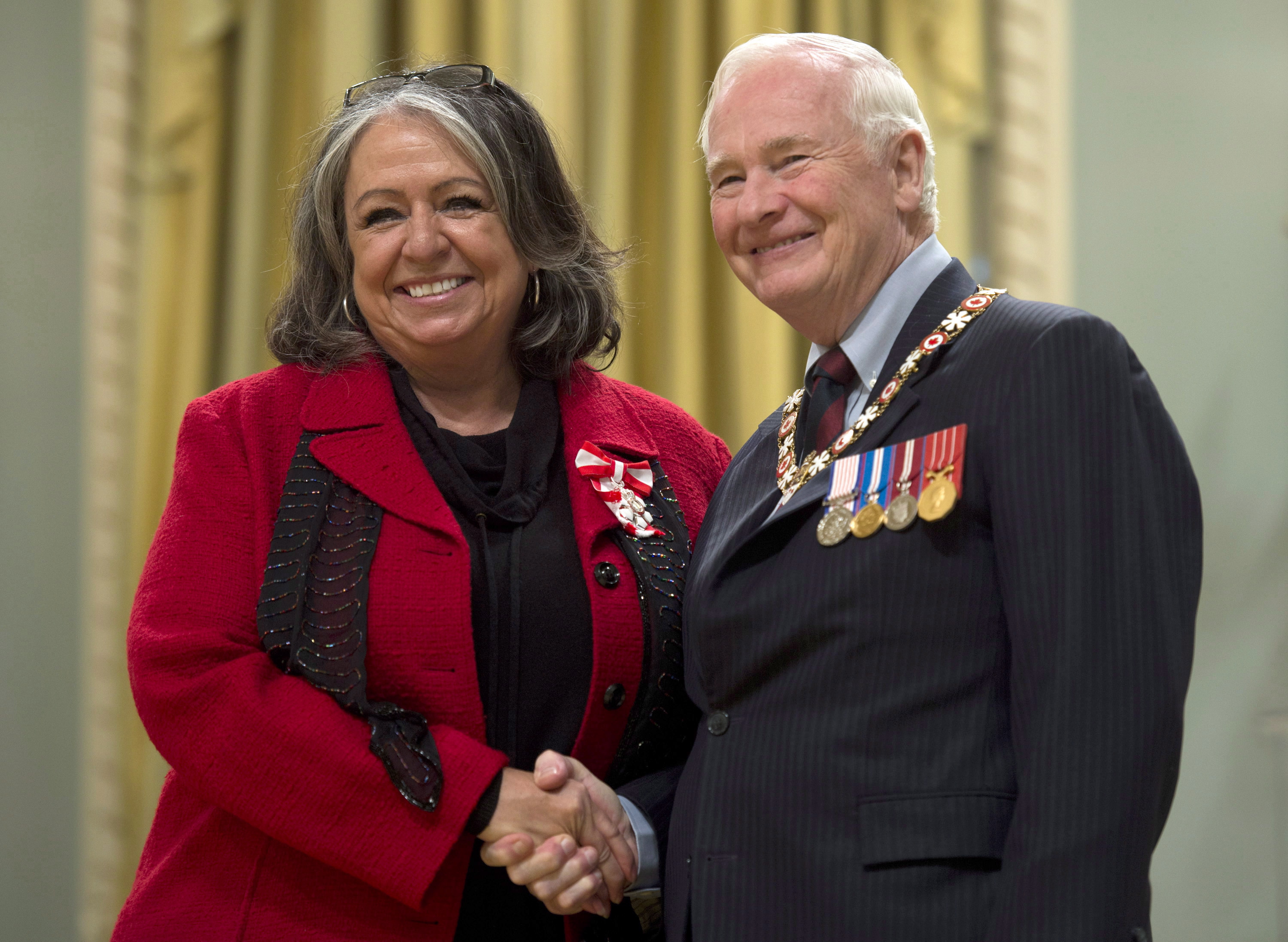 Governor General David Johnston invests Senator Lankin into the Order of Canada during a ceremony at Rideau Hall in 2013 in Ottawa. (Photo credit: The Canadian Press/Adrian Wyld)
Governor General David Johnston invests Senator Lankin into the Order of Canada during a ceremony at Rideau Hall in 2013 in Ottawa. (Photo credit: The Canadian Press/Adrian Wyld)
What made you want to get into politics?
Before I worked at the Don Jail, I was the executive director of a private for-profit childcare centre and I became very attuned to the concerns of working parents, including the challenges in finding quality childcare. I became an advocate for publicly funded childcare and eventually a founding member of the Ontario Coalition for Better Childcare.
I engaged with people who were involved in the political process and then I became a member of a riding association. It became clear to me that all the issues I was passionate about required engaging with different levels of government. I learned how to operate within the world of policy and law, so my political career evolved from there.
After provincial politics, you became CEO of the United Way for more than a decade before you retired. How did you end up in the Senate?
My former colleagues at the United Way got their heads together and determined, rightly or wrongly, that they thought I would be a great candidate for the Senate. They nominated me through the Independent Advisory Board for Senate Appointments process, which was brand-new at the time, and then they told me. I was honored that they thought I was worthy, but I didn’t think anything would materialize until I got the phone call from the Prime Minister’s Office.
You successfully sponsored the bill that changed the lyrics in “O Canada” from “in all thy sons command” to “in all of us command.” Why was this change important to you?
This change to the gender-neutral language had been discussed for more than 30 years, so it wasn’t new. Government ministers, MPs and senators had tried — and failed — to bring through legislation making this change.
I wasn’t passionate about this specific issue, but I was always aware of evolving language in institutions and processes. In the trade union movement, I was part of a group that wanted to change “chairman” to “chair” or “mailman” to “letter carrier,” and so on.
Former senator Nancy Ruth was the leading senator on this bill, which was initiated by MP Mauril Bélanger, who has since passed away. She asked me to take over the file after she retired. I thought about my great-granddaughters — I had two at the time, and I have five now — and the amazing, yet quiet impact this would have on them.
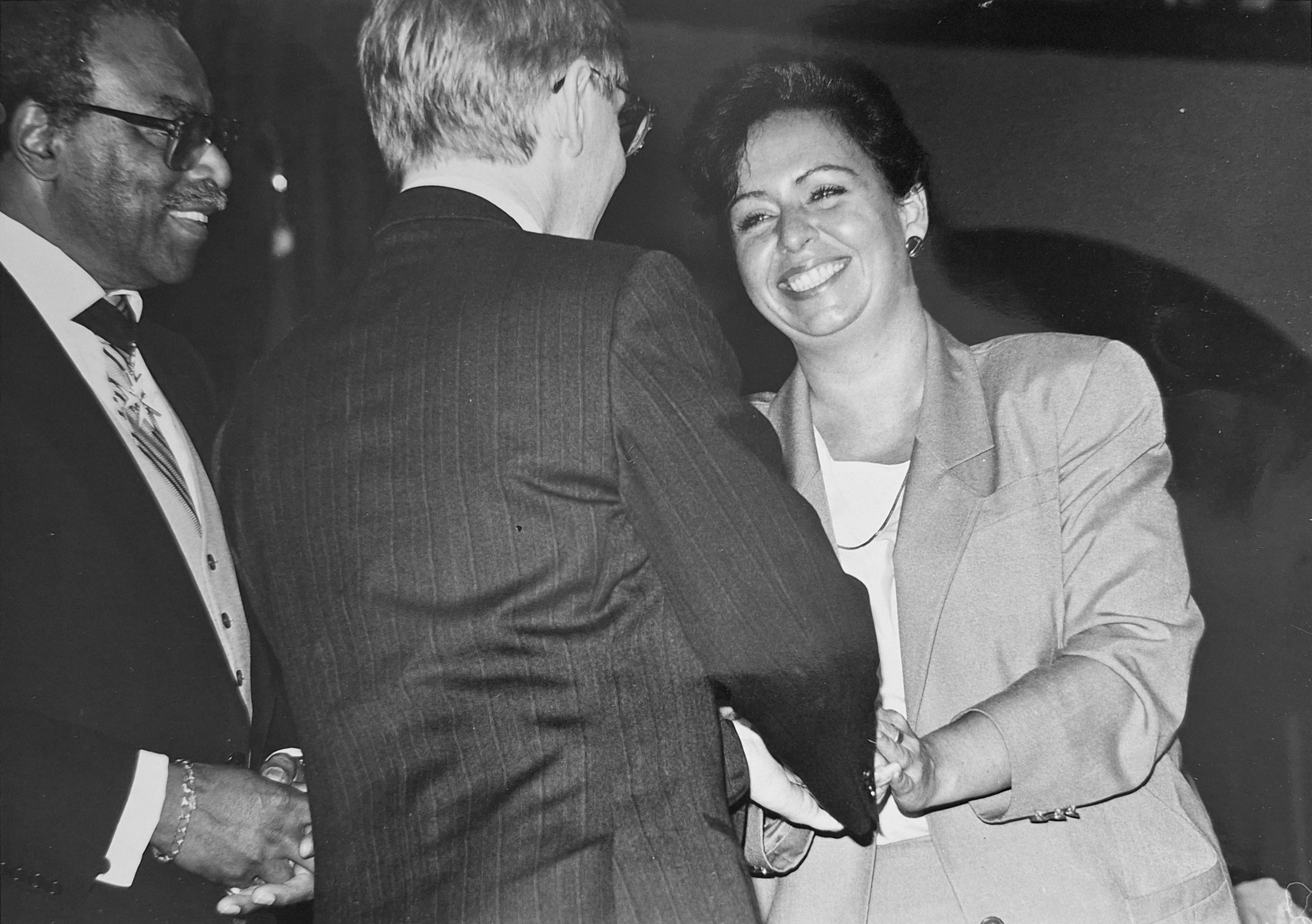 Senator Lankin shakes hands with Mr. Rae after she was sworn into his cabinet in 1990 at just 36 years old. Throughout her time in provincial politics, she served as Minister of Government Services and Chair of Management Board, Minister of Health and Long Term Care, and Minister of Economic Development and Trade. (Photo credit: Office of Senator Frances Lankin)
Senator Lankin shakes hands with Mr. Rae after she was sworn into his cabinet in 1990 at just 36 years old. Throughout her time in provincial politics, she served as Minister of Government Services and Chair of Management Board, Minister of Health and Long Term Care, and Minister of Economic Development and Trade. (Photo credit: Office of Senator Frances Lankin)
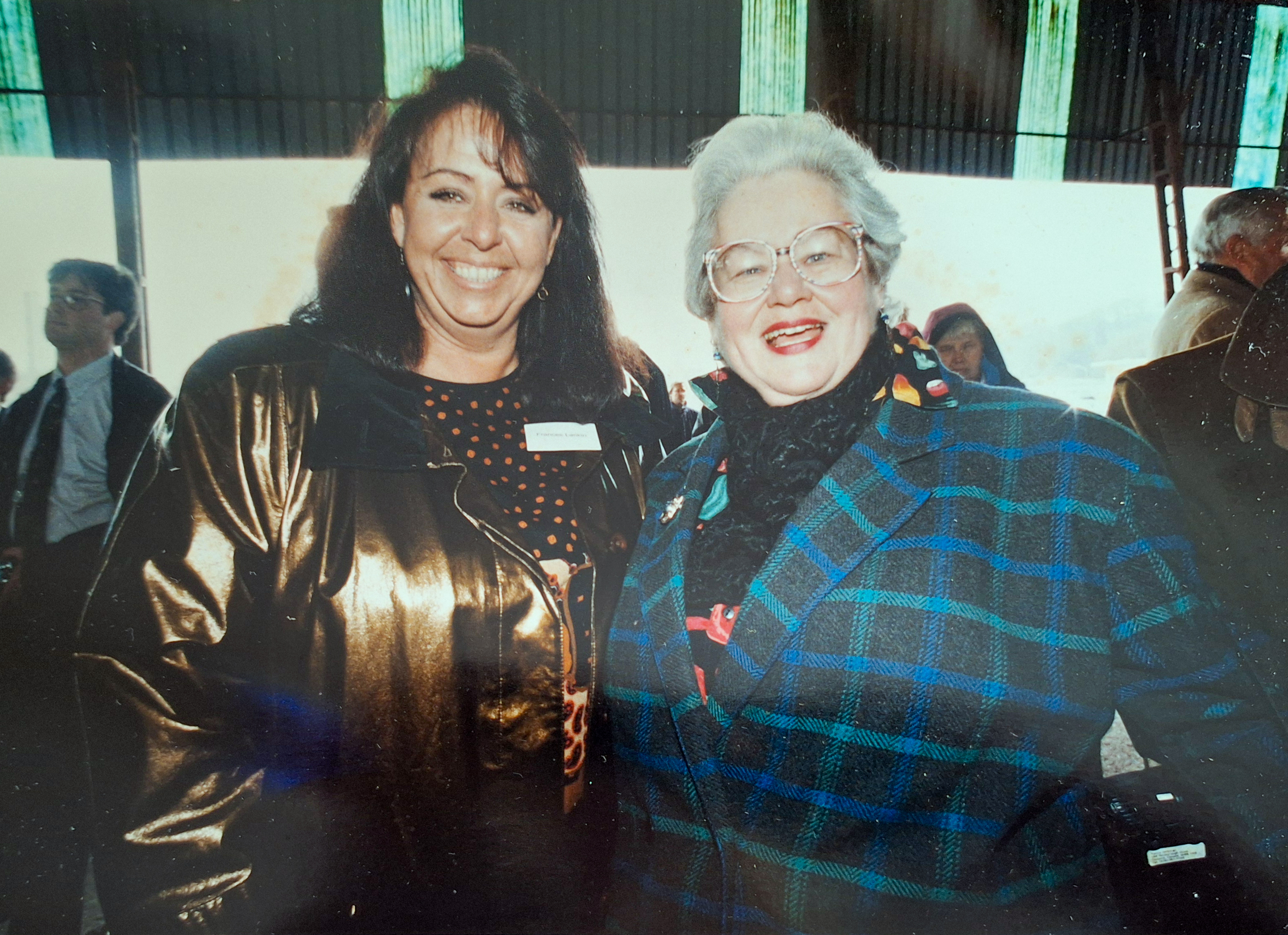 Former senator Nancy Ruth, right, was an early proponent of changing the lyrics in “O Canada” from “in all thy sons command” to “in all of us command.” Senator Lankin picked up the torch and successfully passed a bill adopting the change in 2018. The duo is pictured here in the 1990s, years before they took their seats in the Red Chamber. (Photo credit: Office of Senator Frances Lankin)
Former senator Nancy Ruth, right, was an early proponent of changing the lyrics in “O Canada” from “in all thy sons command” to “in all of us command.” Senator Lankin picked up the torch and successfully passed a bill adopting the change in 2018. The duo is pictured here in the 1990s, years before they took their seats in the Red Chamber. (Photo credit: Office of Senator Frances Lankin)
One of the most exhilarating moments I experienced after this change was when Canada’s National Women’s Hockey Team won gold, and they were singing the national anthem. I don’t know if any of them were aware of the story behind the lyrics, but for me the words they were singing were reflective of their place and achievement.
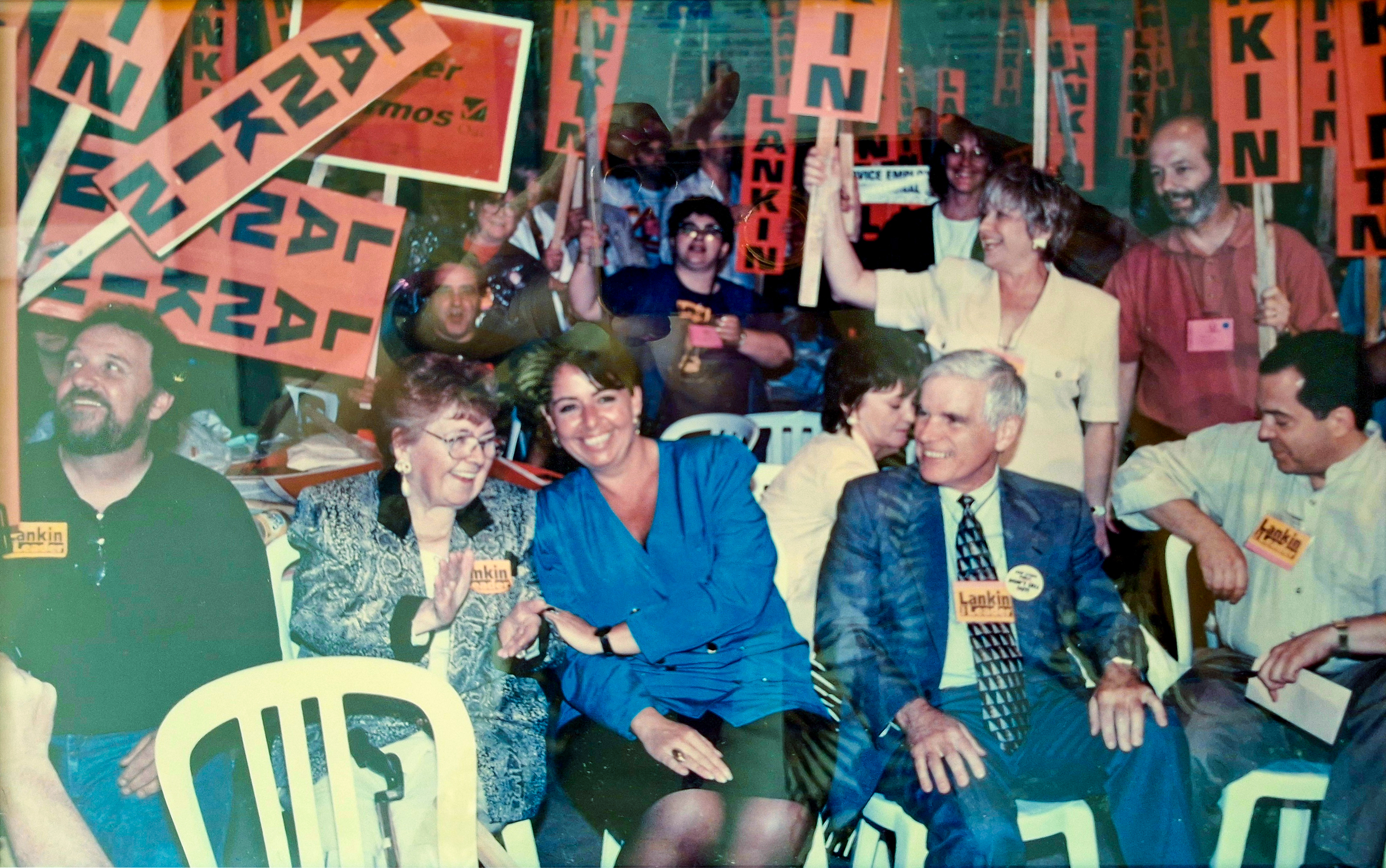 Family, friends and colleagues show their support for Senator Lankin in her leadership bid for the Ontario NDP in 1996, which she lost to Howard Hampton. This framed photo in her office shows her sitting in the centre with her mother Frances Ollman, her brother Ted Ollman, far left, and, from right, former Ontario cabinet ministers Dave Cook and Floyd Laughren. (Photo credit: Office of Senator Frances Lankin)
Family, friends and colleagues show their support for Senator Lankin in her leadership bid for the Ontario NDP in 1996, which she lost to Howard Hampton. This framed photo in her office shows her sitting in the centre with her mother Frances Ollman, her brother Ted Ollman, far left, and, from right, former Ontario cabinet ministers Dave Cook and Floyd Laughren. (Photo credit: Office of Senator Frances Lankin)
Before your Senate appointment, you were a member of the Security Intelligence Review Committee. Since your appointment, you have served on the National Security and Intelligence Committee of Parliamentarians (NSICOP). How has Canada’s national security evolved throughout your time with both these groups?
I believe that more people have slowly become more aware of the importance of the national security and intelligence file. We’re beginning to better understand how foreign interference affects our domestic lives, from our democratic processes to our critical infrastructure and our institutions like banks and hospitals.
The creation of NSICOP was a remarkable development, although initially there was resistance to the creation of a parliamentary body that would give MPs and senators security clearance to deal with matters of national security. Today, some people think that all parliamentarians should have security clearance, but this is not a static issue. It’s an evolving file and it has been incredible to have a ringside seat and an active role in reviewing how governments have responded to foreign threats.
Canadians who are following news around the foreign interference inquiry have more knowledge now than I did after my first set of extensive briefings. We have come a long way.
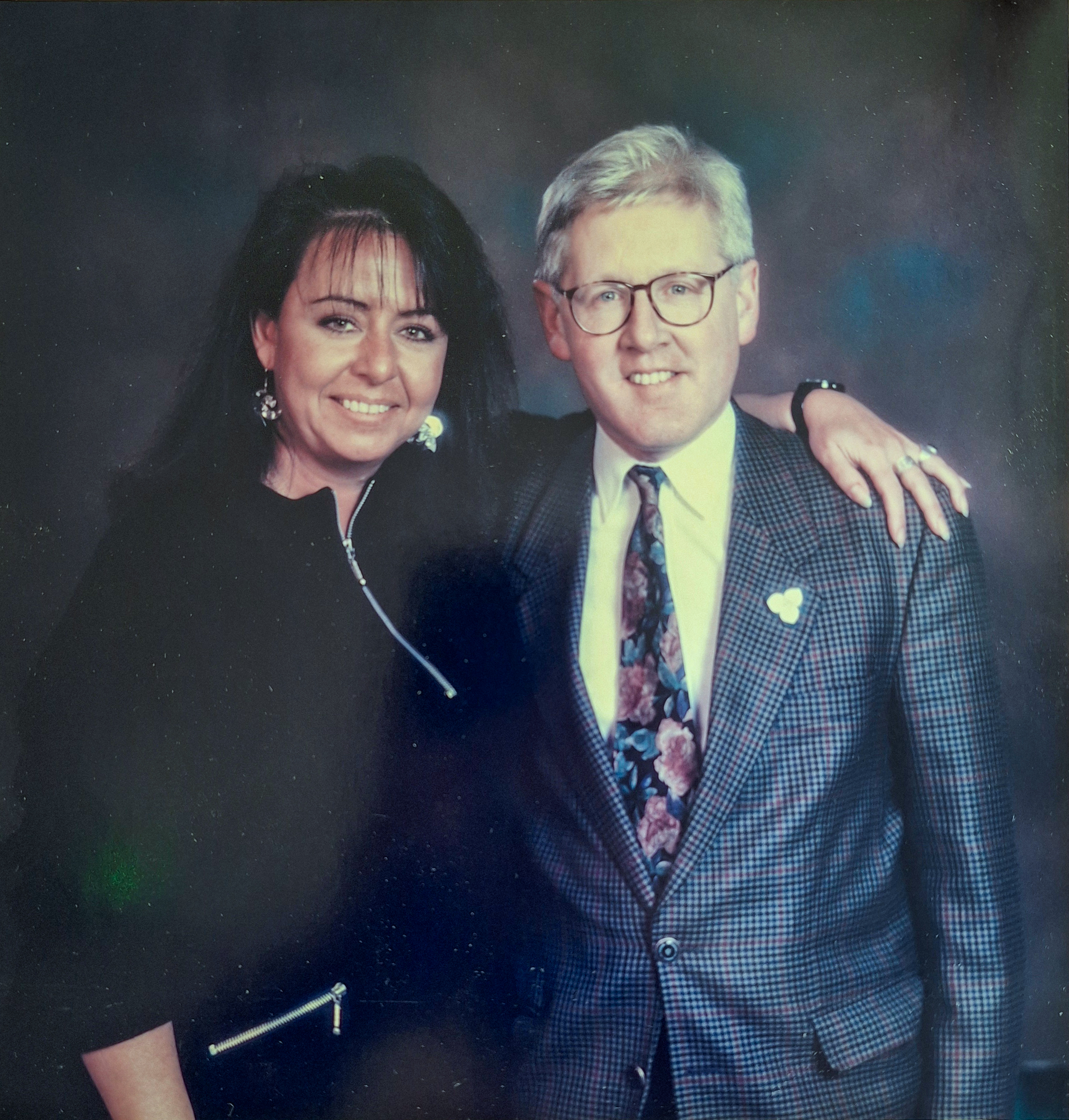 Before she was appointed to the Senate, Senator Frances Lankin was an Ontario MPP and cabinet minister under former NDP premier Bob Rae. (Photo credit: Office of Senator Frances Lankin)
Before she was appointed to the Senate, Senator Frances Lankin was an Ontario MPP and cabinet minister under former NDP premier Bob Rae. (Photo credit: Office of Senator Frances Lankin)
What of your extensive Senate committee or legislative work stands out to you?
Almost all of it.
I was Minister of Health in Ontario at one point, and when I arrived in the Senate, I was able to work on the legalization of cannabis and medical assistance in dying files. I was Minister of Economic Development and Trade in Ontario and while in the Senate I sponsored a bill that better protects domestic producers from increasing imports.
As a member of the Ontario cabinet, I helped pass anti-scab legislation. Here in the Senate, I was able to carry through legislation that prevents federally regulated corporations from replacing their striking workers.
One of my greatest honours has been to work with the growing number of Indigenous senators. I think of my work on Bill S-3, which aims to eliminate sex-based discrimination in the Indian Act, although we are still striving for solutions.
There are bookmarks from the beginning to the end of my career that show the complexity and, in some ways, the elegance of our federation. It’s not easy going, but it helps us get to the right answer.
You were born in London, Ontario, you spent many years in Toronto and you now live in a small town outside of North Bay. How did you end up there and what makes it home for you?
I met a man that I loved from Restoule, Ontario so we built our life there together. I spent many years commuting four hours every week to Toronto and then five hours to Ottawa for many years after that.
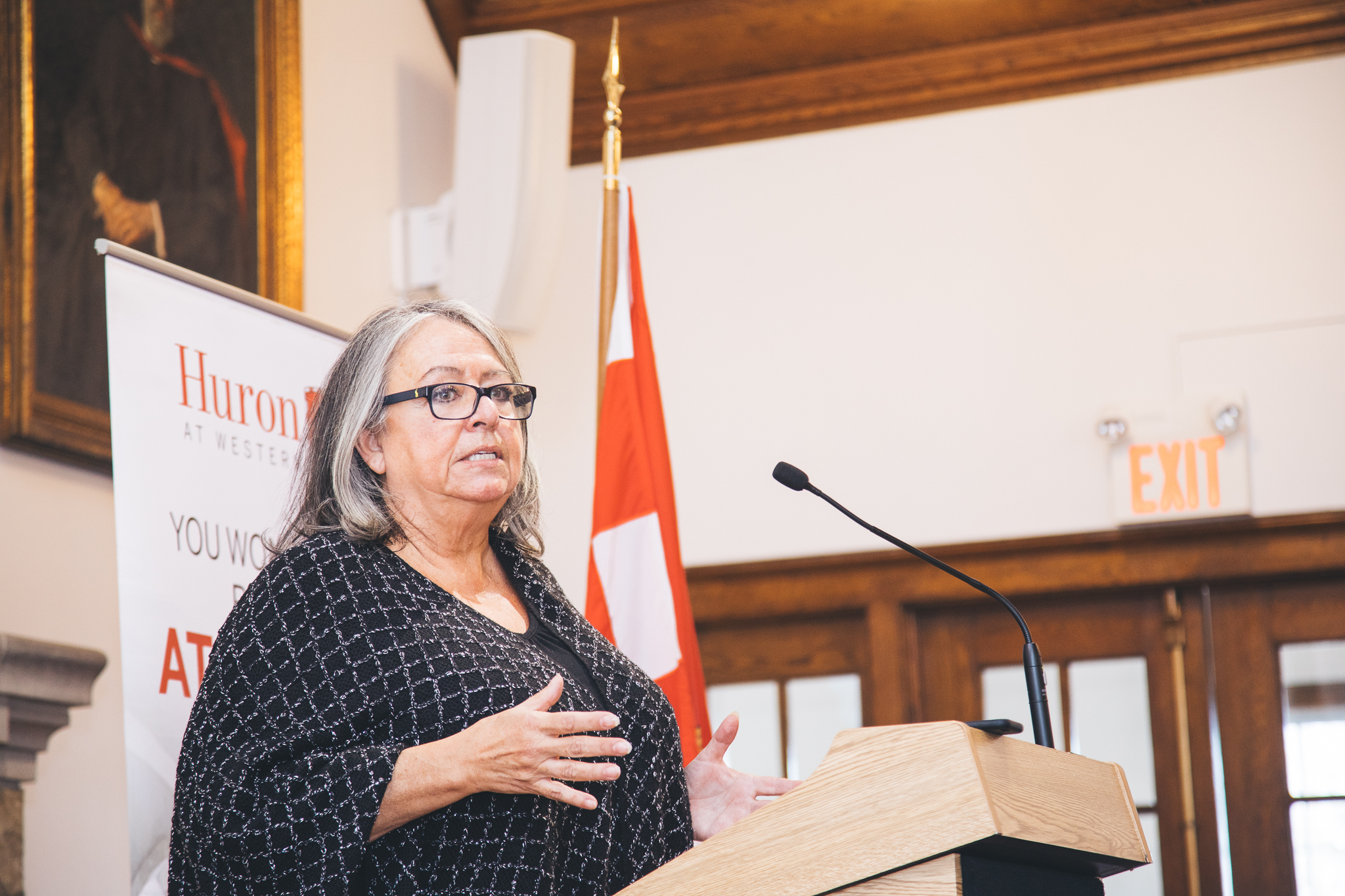 Senator Lankin speaks to students and faculty at Huron University College in London, Ontario about the history and role of the Senate, which was organized as part of the SENgage outreach program in 2017. (Photo credit: Office of Senator Frances Lankin)
Senator Lankin speaks to students and faculty at Huron University College in London, Ontario about the history and role of the Senate, which was organized as part of the SENgage outreach program in 2017. (Photo credit: Office of Senator Frances Lankin)
The sense of community keeps me there. It’s home to people from all walks of life, such as traditional northerners, hunters, fishers and those who have migrated from cities to seek a different quality of life. It’s a magical place.
What’s next for you?
I still need to figure that out, but I know that it won’t be simply staying quiet at home. That’s not me. I already do a lot of volunteering, and I will continue that work.
There’s a world of possibilities and maybe something will just drop in my path and take me down a new road. I’m open and ready to step into the next phase of my life.
Related articles
Tags
Committee news
‘On to something new’: Senator Lankin retires

In Senator Frances Lankin’s eight years in the Senate, she worked to legalize cannabis, change the rules to the Red Chamber, examine foreign interference and adopt gender-neutral lyrics to “O Canada.”
It’s a varied Senate resume that mirrors her time in provincial politics and the unconventional career path that led her there.
Senator Frances is taking an early retirement from the Senate on October 21, 2024, but she says she’s not done working for her community. Learn about her political accomplishments and her lifelong advocacy for women’s and workers’ rights.
Your mandatory retirement date is not for another five years. What made you decide to leave the Senate early?
It’s a confluence of things in my life. My husband passed away almost two years ago, I’ve had some health issues of my own, and I’ve been thinking a lot about the right time to move on to something new.
I realized that I need to close this chapter before I can write the next because every day something comes up in the Senate Chamber that I want to follow up on. I decided in the late summer that it was time to set an early retirement date and stick to it.
 Senator V. Peter Harder gives Senator Lankin her senator’s pin ahead of her swearing-in ceremony in 2016 as former senator Bob Runciman looks on.
Senator V. Peter Harder gives Senator Lankin her senator’s pin ahead of her swearing-in ceremony in 2016 as former senator Bob Runciman looks on.
Throughout your wide-ranging career, you have advocated for women’s and workers’ rights. How did you become passionate about these issues?
After my university studies, I wanted to work in probation and parole, but the only way I could get into that line of work was through an entry-level position as a correctional officer, or a “jail guard” as it was called back then. I became one of the first women in Ontario to work as a correctional officer with male inmates at the Don Jail in Toronto.
I was quickly radicalized around issues of equality and sexual harassment in the workplace, and I started getting involved with the Ontario Public Service Employees Union (OPSEU). I eventually switched careers to work for OPSEU as an Equal Opportunities Coordinator, an economic researcher and then a negotiator for province-wide contracts. I was also a member of the Ontario Federation of Labour Women’s Committee and generally active throughout the labour movement.
I have long considered myself to be a feminist, so these issues have been in lockstep for me all the way through my career.
 Governor General David Johnston invests Senator Lankin into the Order of Canada during a ceremony at Rideau Hall in 2013 in Ottawa. (Photo credit: The Canadian Press/Adrian Wyld)
Governor General David Johnston invests Senator Lankin into the Order of Canada during a ceremony at Rideau Hall in 2013 in Ottawa. (Photo credit: The Canadian Press/Adrian Wyld)
What made you want to get into politics?
Before I worked at the Don Jail, I was the executive director of a private for-profit childcare centre and I became very attuned to the concerns of working parents, including the challenges in finding quality childcare. I became an advocate for publicly funded childcare and eventually a founding member of the Ontario Coalition for Better Childcare.
I engaged with people who were involved in the political process and then I became a member of a riding association. It became clear to me that all the issues I was passionate about required engaging with different levels of government. I learned how to operate within the world of policy and law, so my political career evolved from there.
After provincial politics, you became CEO of the United Way for more than a decade before you retired. How did you end up in the Senate?
My former colleagues at the United Way got their heads together and determined, rightly or wrongly, that they thought I would be a great candidate for the Senate. They nominated me through the Independent Advisory Board for Senate Appointments process, which was brand-new at the time, and then they told me. I was honored that they thought I was worthy, but I didn’t think anything would materialize until I got the phone call from the Prime Minister’s Office.
You successfully sponsored the bill that changed the lyrics in “O Canada” from “in all thy sons command” to “in all of us command.” Why was this change important to you?
This change to the gender-neutral language had been discussed for more than 30 years, so it wasn’t new. Government ministers, MPs and senators had tried — and failed — to bring through legislation making this change.
I wasn’t passionate about this specific issue, but I was always aware of evolving language in institutions and processes. In the trade union movement, I was part of a group that wanted to change “chairman” to “chair” or “mailman” to “letter carrier,” and so on.
Former senator Nancy Ruth was the leading senator on this bill, which was initiated by MP Mauril Bélanger, who has since passed away. She asked me to take over the file after she retired. I thought about my great-granddaughters — I had two at the time, and I have five now — and the amazing, yet quiet impact this would have on them.
 Senator Lankin shakes hands with Mr. Rae after she was sworn into his cabinet in 1990 at just 36 years old. Throughout her time in provincial politics, she served as Minister of Government Services and Chair of Management Board, Minister of Health and Long Term Care, and Minister of Economic Development and Trade. (Photo credit: Office of Senator Frances Lankin)
Senator Lankin shakes hands with Mr. Rae after she was sworn into his cabinet in 1990 at just 36 years old. Throughout her time in provincial politics, she served as Minister of Government Services and Chair of Management Board, Minister of Health and Long Term Care, and Minister of Economic Development and Trade. (Photo credit: Office of Senator Frances Lankin)
 Former senator Nancy Ruth, right, was an early proponent of changing the lyrics in “O Canada” from “in all thy sons command” to “in all of us command.” Senator Lankin picked up the torch and successfully passed a bill adopting the change in 2018. The duo is pictured here in the 1990s, years before they took their seats in the Red Chamber. (Photo credit: Office of Senator Frances Lankin)
Former senator Nancy Ruth, right, was an early proponent of changing the lyrics in “O Canada” from “in all thy sons command” to “in all of us command.” Senator Lankin picked up the torch and successfully passed a bill adopting the change in 2018. The duo is pictured here in the 1990s, years before they took their seats in the Red Chamber. (Photo credit: Office of Senator Frances Lankin)
One of the most exhilarating moments I experienced after this change was when Canada’s National Women’s Hockey Team won gold, and they were singing the national anthem. I don’t know if any of them were aware of the story behind the lyrics, but for me the words they were singing were reflective of their place and achievement.
 Family, friends and colleagues show their support for Senator Lankin in her leadership bid for the Ontario NDP in 1996, which she lost to Howard Hampton. This framed photo in her office shows her sitting in the centre with her mother Frances Ollman, her brother Ted Ollman, far left, and, from right, former Ontario cabinet ministers Dave Cook and Floyd Laughren. (Photo credit: Office of Senator Frances Lankin)
Family, friends and colleagues show their support for Senator Lankin in her leadership bid for the Ontario NDP in 1996, which she lost to Howard Hampton. This framed photo in her office shows her sitting in the centre with her mother Frances Ollman, her brother Ted Ollman, far left, and, from right, former Ontario cabinet ministers Dave Cook and Floyd Laughren. (Photo credit: Office of Senator Frances Lankin)
Before your Senate appointment, you were a member of the Security Intelligence Review Committee. Since your appointment, you have served on the National Security and Intelligence Committee of Parliamentarians (NSICOP). How has Canada’s national security evolved throughout your time with both these groups?
I believe that more people have slowly become more aware of the importance of the national security and intelligence file. We’re beginning to better understand how foreign interference affects our domestic lives, from our democratic processes to our critical infrastructure and our institutions like banks and hospitals.
The creation of NSICOP was a remarkable development, although initially there was resistance to the creation of a parliamentary body that would give MPs and senators security clearance to deal with matters of national security. Today, some people think that all parliamentarians should have security clearance, but this is not a static issue. It’s an evolving file and it has been incredible to have a ringside seat and an active role in reviewing how governments have responded to foreign threats.
Canadians who are following news around the foreign interference inquiry have more knowledge now than I did after my first set of extensive briefings. We have come a long way.
 Before she was appointed to the Senate, Senator Frances Lankin was an Ontario MPP and cabinet minister under former NDP premier Bob Rae. (Photo credit: Office of Senator Frances Lankin)
Before she was appointed to the Senate, Senator Frances Lankin was an Ontario MPP and cabinet minister under former NDP premier Bob Rae. (Photo credit: Office of Senator Frances Lankin)
What of your extensive Senate committee or legislative work stands out to you?
Almost all of it.
I was Minister of Health in Ontario at one point, and when I arrived in the Senate, I was able to work on the legalization of cannabis and medical assistance in dying files. I was Minister of Economic Development and Trade in Ontario and while in the Senate I sponsored a bill that better protects domestic producers from increasing imports.
As a member of the Ontario cabinet, I helped pass anti-scab legislation. Here in the Senate, I was able to carry through legislation that prevents federally regulated corporations from replacing their striking workers.
One of my greatest honours has been to work with the growing number of Indigenous senators. I think of my work on Bill S-3, which aims to eliminate sex-based discrimination in the Indian Act, although we are still striving for solutions.
There are bookmarks from the beginning to the end of my career that show the complexity and, in some ways, the elegance of our federation. It’s not easy going, but it helps us get to the right answer.
You were born in London, Ontario, you spent many years in Toronto and you now live in a small town outside of North Bay. How did you end up there and what makes it home for you?
I met a man that I loved from Restoule, Ontario so we built our life there together. I spent many years commuting four hours every week to Toronto and then five hours to Ottawa for many years after that.
 Senator Lankin speaks to students and faculty at Huron University College in London, Ontario about the history and role of the Senate, which was organized as part of the SENgage outreach program in 2017. (Photo credit: Office of Senator Frances Lankin)
Senator Lankin speaks to students and faculty at Huron University College in London, Ontario about the history and role of the Senate, which was organized as part of the SENgage outreach program in 2017. (Photo credit: Office of Senator Frances Lankin)
The sense of community keeps me there. It’s home to people from all walks of life, such as traditional northerners, hunters, fishers and those who have migrated from cities to seek a different quality of life. It’s a magical place.
What’s next for you?
I still need to figure that out, but I know that it won’t be simply staying quiet at home. That’s not me. I already do a lot of volunteering, and I will continue that work.
There’s a world of possibilities and maybe something will just drop in my path and take me down a new road. I’m open and ready to step into the next phase of my life.


